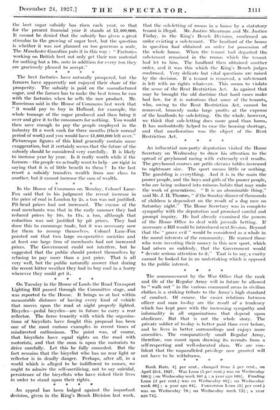The beet factories have naturally prospered, but the farmers have
apparently not enjoyed their share of the prosperity. The subsidy is .paid on the manufactured sugar, and the farmer has to make the best terms he can with the factories when he sells the raw product. Mr. Runciman said in the House of CommOns last week that "it would pay to buy in Holland, for example, the whole tonnage of the sugar produced and then bring it over and give itto the consumers for nothing. You would then save enough to pay the people employed in the industry £3 a. week each for three months (their normal period of work) and you would have £1,600,000 left over." Picturesque figures of this kind generally contain some exaggeration, but it certainly seems that the future of the subsidy should be considered very carefully. It is likely to increase year by year. Is it really worth while if the farmers—the people we actually want to help—are right in saying that it is of little benefit to them ? In the last resort a subsidy transfers wealth from one class to another, but it cannot increase the sum of wealth.






























 Previous page
Previous page